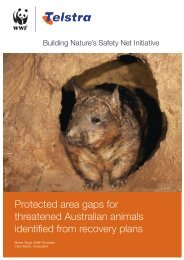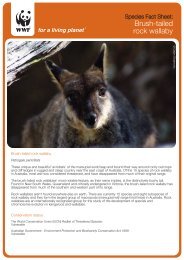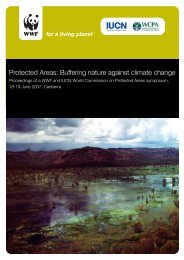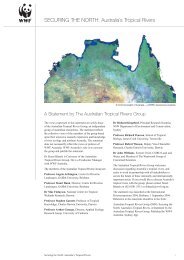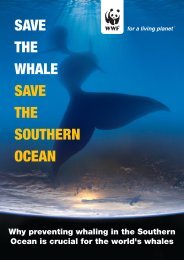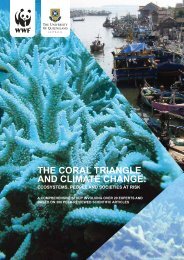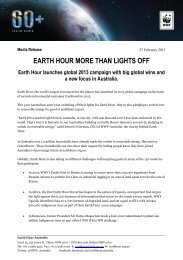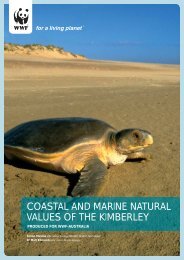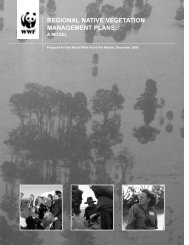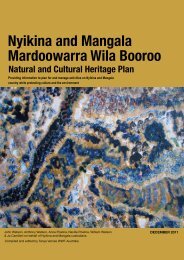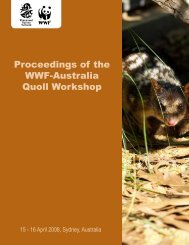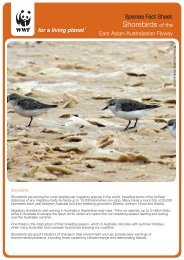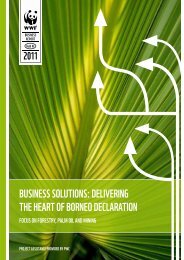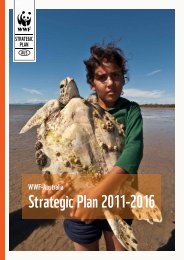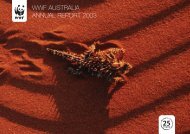Indigenous Peoples and Conservation Organizations
Indigenous Peoples and Conservation Organizations
Indigenous Peoples and Conservation Organizations
Create successful ePaper yourself
Turn your PDF publications into a flip-book with our unique Google optimized e-Paper software.
14 <strong>Conservation</strong> Partnerships<br />
indigenous peoples <strong>and</strong> local communities participate<br />
in determining the criteria for measuring sustainability.<br />
If they underst<strong>and</strong> the reasons for<br />
changing behaviors, they are more likely to make<br />
the changes.<br />
There is no blueprint for working with indigenous<br />
peoples. Each situation is different, not<br />
only culturally but socially, politically, economically,<br />
<strong>and</strong> geographically. While WWF’s<br />
involvement is based on a clear set of principles,<br />
a solid underst<strong>and</strong>ing of the links between biological<br />
<strong>and</strong> cultural diversity, <strong>and</strong> a genuine<br />
appreciation for indigenous peoples’ contribution<br />
to biodiversity conservation, its operational<br />
approach should be sensitive <strong>and</strong> flexible in order<br />
to maximize the input of its partners.<br />
2.2 Why Human Rights <strong>and</strong><br />
Self-Determination Should Matter<br />
to <strong>Conservation</strong>ists<br />
<strong>Indigenous</strong> organizations repeatedly <strong>and</strong> forcefully<br />
insist that development <strong>and</strong> the environment<br />
must be approached from a human-rights perspective.<br />
The conservation movement has often<br />
responded that human rights are beyond its mission<br />
<strong>and</strong> m<strong>and</strong>ate. Increasingly the difference<br />
between these two viewpoints is narrowing.<br />
Environmental human rights—the right of present<br />
<strong>and</strong> future generations to enjoy a healthy life in a<br />
healthy environment—are implicitly at the heart of<br />
the environmental agenda, <strong>and</strong> will become more<br />
explicitly so in the future. Environmental human<br />
rights are linked to the right to a decent quality of<br />
life <strong>and</strong> to other related rights recognized in the<br />
International Covenant on Economic, Social, <strong>and</strong><br />
Cultural Rights. WWF <strong>and</strong> other conservation<br />
organizations recognize that indigenous groups<br />
cannot be expected to commit themselves to conservation<br />
if their livelihoods are in peril from lack<br />
of secure tenure to l<strong>and</strong> <strong>and</strong> resources. Indeed, it is<br />
the strength of their claim to the l<strong>and</strong>, coupled with<br />
long histories of managing it wisely, that make<br />
them attractive potential partners for environmental<br />
stewardship. They cannot play this role under conditions<br />
of political oppression <strong>and</strong> marginalization.<br />
The more people’s basic needs are met <strong>and</strong> their<br />
rights respected, the more they will be willing <strong>and</strong><br />
able to engage in biodiversity conservation because<br />
they underst<strong>and</strong> it is in their own interest to do so.<br />
For indigenous peoples, the question of human<br />
rights is bound up with the struggle for selfdetermination,<br />
which involves control of traditional<br />
resources <strong>and</strong> cultural autonomy within<br />
existing nation states. WWF acknowledges<br />
indigenous peoples’ right to self-determination,<br />
<strong>and</strong> has built its own policies on it. When<br />
indigenous peoples define themselves as distinct<br />
nations <strong>and</strong> seek political autonomy, WWF<br />
respects their efforts to negotiate their status with<br />
governments, but does not consider this to be an<br />
issue on which it must take sides.<br />
III. Key Program Issues for<br />
<strong>Conservation</strong> <strong>Organizations</strong><br />
Collaboration with indigenous peoples falls<br />
under several programmatic areas. This section<br />
explores six of them: 1) participation <strong>and</strong> prior<br />
informed consent; 2) protected areas; 3) traditional<br />
ecological knowledge <strong>and</strong> management<br />
practices; 4) alternative economic options <strong>and</strong><br />
benefit sharing; 5) mitigation of environmental<br />
impacts; <strong>and</strong> 6) conservation capacity-building.<br />
Many of these issues are discussed in more detail<br />
in the case studies that follow.<br />
3.1 Prior Informed Consent<br />
Prior informed consent (PIC) is a fundamental<br />
principle for indigenous collaboration with outside<br />
organizations <strong>and</strong> the basis for protecting all<br />
other rights. PIC requires outsiders proposing<br />
any action to fully inform indigenous groups of<br />
the reasons for the activity, how it will be implemented<br />
in detail, the potential risks involved, <strong>and</strong><br />
how this activity realistically can be expected to<br />
affect other aspects of community life in the short<br />
<strong>and</strong> long terms. If the indigenous community<br />
withholds its consent, no activities can begin, <strong>and</strong><br />
activities already under way must be halted. The<br />
following types of activities relevant to biodiversity<br />
conservation should be subject to PIC:<br />
• the extraction of renewable or nonrenewable<br />
resources from indigenous communities<br />
or their territories;<br />
• the acquisition of knowledge from a person<br />
or people, whether for commercial or noncommercial<br />
purposes; <strong>and</strong><br />
• all projects affecting indigenous communities,<br />
including infrastructure construction of<br />
roads <strong>and</strong> dams, <strong>and</strong> colonization schemes.



